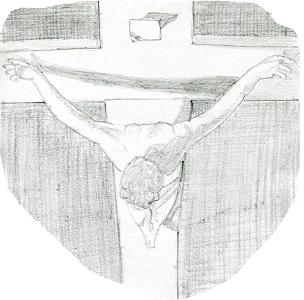
“If you remain in my word. You will truly be my disciples, and you will know the truth, and the truth will set you free” (John 11:15).
Dn 3:14-20, 91-92, 95; Jn 8:31-42
Today’s first reading from the Book of Daniel tells the heroic story of the three young men who defied the command of the king of Babylon to worship a golden idol and were thrown into a white-hot furnace. Many summer campers know their names from the famous campfire song that repeats them: Shadrach, Meshach and Abednego standing up to King Nebuchadnezzar.
Idolatry, or worshiping a false God, was a primal sin for monotheistic Israel, and a theme underlying the conflict between Jesus and his opponents, who accused him of blasphemy for claiming equality with God. The author of the fourth Gospel deepens these quarrels with the surviving rabbis after the Jewish-Roman war (70-73 CE) that destroyed Jerusalem and forced its survivors from the region.
In today’s gospel selection, the fourth evangelist takes up a question that St. Paul explores in his Letter to the Romans. Were Christians discounting Abraham by abandoning the Covenant based on obedience to the Commandments revealed to Moses? St. Paul had argued that those who placed their confidence in the Law were subject to its power, while those who put their faith in Jesus experienced the liberating power of grace. They were true children of Abraham because they trusted in God’s promises, not because they followed the Law, which came after Abraham. Those who followed the Law were accountable to the law, which also had the curious effect of enticing them, since what is forbidden becomes even more desirable.
The Jewish Scripture scholars and religious leaders were under the law, but Christians were free because of the gift of salvation Jesus won for them by his death and resurrection. This theological argument in the fourth Gospel depends less on religious obedience as such and more on a love relationship with God. It is because we are united in love with Jesus and incorporated into his body by baptism that we always share in his life. We are set free from fear and servitude, from obsession with rules we must obey to be sure we are pleasing to God.
To be with Jesus is to share in the Father’s unconditional love. God sees us and says, “You are my beloved children.” Even in our failures, God’s mercy is never withdrawn. We are God’s family. Remaining in Jesus and his word is what sets us free and why we can risk mistakes to love, by going with the flow of the Spirit, discerning our way each day.
Like Abraham, we trust in God’s love. We are free from fear and anxiety, so when we encounter the inevitable challenges of life, we will not lose hope or stop trusting that God is present in every experience, supporting and comforting us especially when life is difficult or disappointing.
This is the joy of the Gospel, and it never ceases to be the Good News that holds us and keeps us moving forward in Christ. This is the truth that sets us free.
----------------------------------------
During Lent and Holy Week, many of the scripture readings will reflect the political and religious divisions and uncertainty that roiled Judaism and the earliest decades of Christianity. Our reflections will take into consideration that the texts contain language that historically served to foster ugly stereotypes and fuel ancient hostility toward Jews. The Catholic Church took a huge step toward correcting those perceptions in the Vatican II document Nostra Aetate. More than 50 years after the promulgation of that document, the church is still wrestling with how to interpret our sacred texts in light of new research and understanding. A good point of reference is a 2019 talk by Pope Francis to the Pontifical Biblical Institute as it addressed the topic, “Jesus and the Pharisees: An Interdisciplinary Reappraisal.” He spoke of the need to “find ways to overcome ancient prejudices.”





